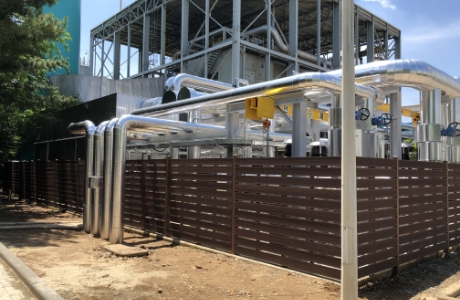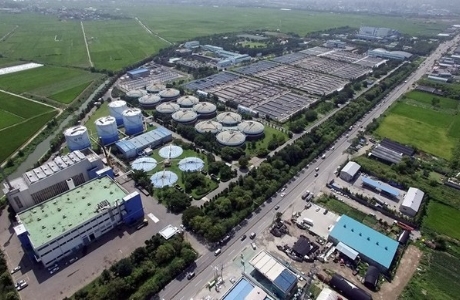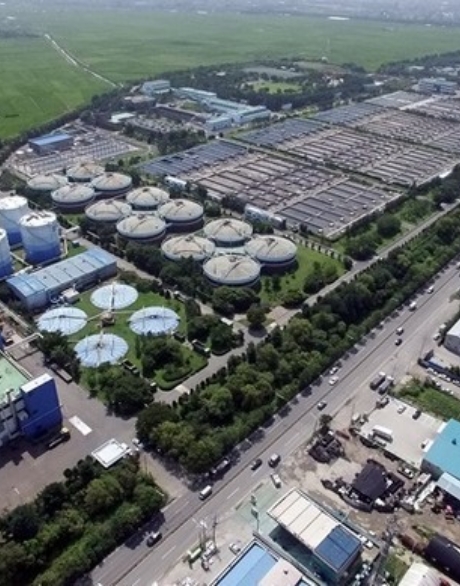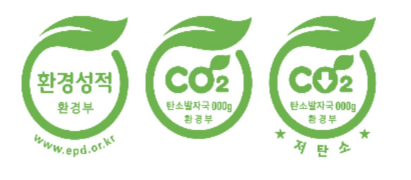
GS Power has continuously developed technology for the efficient utilization of unused energy and currently holds 7 related patents. The company has also achieved results by signing agreements with local governments (Bucheon City and Anyang City) for the utilization of unused energy in urban infrastructure. In addition, the company is actively engaged in providing technology consulting services related to the recovery and supply of unused energy and is participating in the 'Smart Zero Energy City' national R&D project to contribute to research on next-generation urban energy supply technologies.

Bucheon Gulpoho Sewage Treatment Plant Unused Energy Recovery Business

National R&D Project for the Creation of Smart Zero Energy Cities

However, the greenhouse gases emitted into the atmosphere during the energy generation process amount to approximately 66 million tons.
Incheon Comprehensive Energy seeks and invests in external new heat sources to recover and reuse unused energy released into the atmosphere. Through these efforts, it has reduced its gas turbine usage, replacing approximately 34,000 tons of LNG annually and reducing greenhouse gas emissions by about 55,000 tons.

Energy efficiency improvement at Incheon Comprehensive Energy.

a low-temperature heat source to a high-temperature heat source or from a high-temperature
heat source to a low-temperature one,
GS Power installed and operates a heat pump using cooling water from power plant equipment as the heat source on the evaporator side, which can produce 9Gcal (supply capacity for 7,000 households) per hour. This installation was carried out in November 2010 at the Anyang and Bucheon Combined Heat and Power plants.
Additionally, GS Power developed and commercialized a technology that utilizes the world's first medium-temperature water absorption heat pump to recover unused energy for district heating.

Bucheon Fuel Cell Low-Temperature Heat Recovery Business


Incheon Comprehensive Energy is also reviewing and pursuing certification to receive recognition for its excellent energy production efficiency and carbon dioxide reduction effect through the use of external heat sources at the LNG combined heat and power plant.
The goal is to achieve the 'Environmental Label' certification in 2023 and to obtain the low-carbon product certification in 2024.
By satisfying customers' needs for environmentally friendly products, Incheon Comprehensive Energy aims to demonstrate the value of district heating as a means of greenhouse gas reduction.
Incheon Comprehensive Energy is also reviewing and pursuing certification to receive recognition for its excellent energy production efficiency and carbon dioxide reduction effect through the use of external heat sources at the LNG combined heat and power plant.
The goal is to achieve the 'Environmental Label' certification in 2023 and to obtain the low-carbon product certification in 2024.
By satisfying customers' needs for environmentally friendly products, Incheon Comprehensive Energy aims to demonstrate the value of district heating as a means of greenhouse gas reduction.
and Energy Usage

GS Power has completed the implementation of the first plan period (2015-2017) and the second plan period (2018-2020) for greenhouse gas emissions trading, emitting greenhouse gases below the government's allocated quotas. Currently, the company is implementing the third plan period (2021-2025).
To ensure the accuracy of energy usage and greenhouse gas emissions calculations and to establish systematic measurement and data collection methods for activity data and parameters, GS Power conducts annual projects to enhance emission calculation plans. Additionally, the company compiles a greenhouse gas inventory to monitor and manage monthly greenhouse gas emissions.
Furthermore, efforts are made to reduce greenhouse gas emissions per unit of energy through the introduction of high-efficiency facilities within the combined heat and power generation plant, promoting energy conservation.

The company is actively pursuing medium to long-term key carbon reduction measures, including the introduction of high-efficiency power generation facilities, process improvements in existing facilities to enhance energy efficiency, and conducting pilot tests for CCUS technology adoption. In addition, it secures emissions allowances reasonably through the application and improvement of BM coefficients for greenhouse gas emissions permits. The company also continuously monitors changes in related legislation and market trends, aiming to maximize revenue through efficient management of emissions allowances trading.
In particular, in 2021, the company secured an additional allocation of 22,326 tons in anticipation of increased heat supply volume.
emissions
- GS Power
- Incheon Total Energy
- GS Energy
| Category | 2020 | 2021 | 2022 | 2020 | 2021 | 2022 | 2020 | 2021 | 2022 |
|---|---|---|---|---|---|---|---|---|---|
| Total greenhouse gas emissions | 1,953,049 | 2,198,431 | 2,987,955 | 323,596 | 382,327 | 373,840 | 238 | 249 | 291 |
| Direct emissions (Scrope1) | 1,931,348 | 2,174,034 | 2,967,293 | 319,988 | 379,251 | 370,696 | 82 | 95 | 78 |
| Indirect emissions (Scrope2) | 20,662 | 24,402 | 21,704 | 3,144 | 3,076 | 3,608 | 213 | 154 | 157 |
Unit : tCO₂eq
- GS Power
- Incheon Total Energy
- GS Energy
| Category | 2020 | 2021 | 2022 | 2020 | 2021 | 2022 | 2020 | 2021 | 2022 |
|---|---|---|---|---|---|---|---|---|---|
| Total energy usage | 37,298 | 42,046 | 58,361 | 6,386 | 7,545 | 7,496 | 2.7 | 2.9 | 3.1 |
| Direct energy usage * | 36,851 | 41,536 | 57,821 | 6,362 | 7,523 | 7,344 | 1.5 | 1.7 | 1.4 |
| Indirect energy usage ** | 446 | 509 | 540 | 24 | 21 | 152 | 1.2 | 1.2 | 1.7 |
* Fuel consumption for renewable energy facilities such as power plants and fuel cells, GS Power and Incheon Comprehensive Energy both include LNG usage in this category.
** Energy sources used other than fuel, a significant item in power costs
Unit : TJ
GS Energy actively pursues low-carbon energy generation and environmentally friendly initiatives, with a focus on improving energy efficiency, developing renewable energy sources, and adopting carbon-neutral technologies to address climate change.
Furthermore, GS Energy is committed to strengthening its environmental management system and providing differentiated services for sustainable management, contributing to the creation of social value.
Through its carbon-neutral strategy, GS Energy aims to transform into a sustainable energy company, fulfill its responsibilities regarding climate change, and explore a future that has a positive impact on society and the environment.



